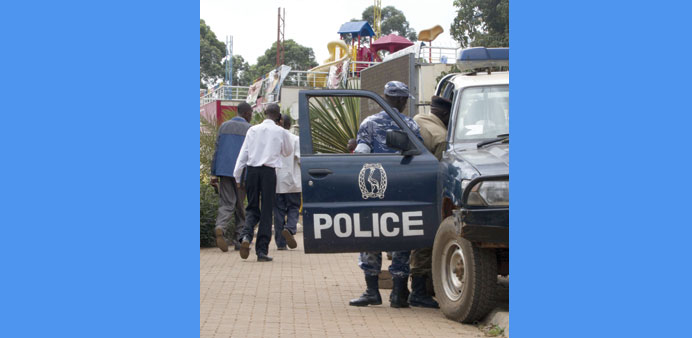Ugandan police personnel stand guard outside a popular shopping mall in Kampala. Ugandan police have said that suspected Shebaab insurgents arrested in weekend raids had planned to carry out bomb attacks.
AFP/Reuters/Kampala
Ugandan police said yesterday that 19 suspected Shebaab insurgents arrested in weekend raids had planned to carry out bomb attacks, as the US embassy said the immediate threat had been “countered”.
Police raids on Saturday came two weeks after Ugandan troops, fighting in Somalia, reportedly provided intelligence that helped US special forces kill the Shebaab’s chief in a devastating air strike.
“Shebaab planned to carry out attacks in Kampala and other towns over the weekend, but police working with sister agencies stopped these attacks and we have recovered the explosives they were to use,” police chief Kale Kayihura told AFP.
No details have been given of possible targets.
“We are interrogating 19 to see what leads we get to help expand the investigation,” police spokesman Fred Enanga said, adding that the suspects were found with “explosive materials related to acts of terror”, and their intentions “were very, very clear”.
He added: “The attack was foiled at a stage where it was imminent”.
Ugandan authorities say they have increased security at hotels and other key sites including Entebbe International Airport since making the arrests.
Yesterday the US embassy lifted warnings to its citizens to stay at home, but said people should remain vigilant.
“Based on co-ordination with Ugandan authorities, and taking into account the heightened security measures the government has put in place, we believe that the immediate threat of a Shebaab attack has been effectively countered,” the embassy said in a statement. “We remain vigilant to the possibility that some of the attack cell could still be at large.”
Last Monday the US embassy warned that Shebaab insurgents may try to exact revenge for a US air strike that killed the militant group’s commander.
“Stay alert to the ongoing potential for terrorist attacks in Uganda,” it said. “We also caution US citizens of the possibility of retaliatory attacks in Uganda by Shebaab in response to the US and Ugandan military actions in Somalia ... which killed Shebaab leader Ahmed Godane.”
Uganda’s government said that the country – a major contributor to AMISOM, the African Union force fighting the Shebaab in Somalia – was “happy” at the death of Godane, and had provided the US with key intelligence on his whereabouts.
During the World Cup final four years ago, Shebaab insurgents killed at least 76 people after setting off explosions that ripped through two restaurants in Kampala.
The strike against Godane came days after AU troops and Somali government forces launched “Operation Indian Ocean”, a major offensive aimed at seizing key ports from the Shebaab and cutting off charcoal exports, one of their key revenue sources.
The Shebaab insurgents have claimed recent attacks in Kenya and Djibouti, and at home in Somalia.
The Shebaab have also claimed responsibility for the assault on the Westgate shopping centre that killed at least 67 people in the Kenyan capital of Nairobi in September last year as well as for attacks on coastal regions.
Last week, the group targeted two military convoys near the capital Mogadishu and on Saturday the group gunned down a senior Somali national security officer in his car, according to local police and a Shebaab spokesman.
In comments last Monday, Fuad Mohamed Khalaf Shongole, a senior Shebaab official, said that he would target Americans in New York and Washington, and “capture Kenya and Uganda”.

